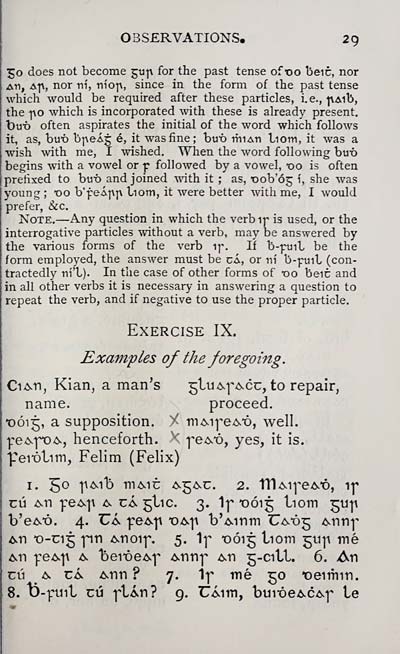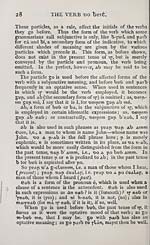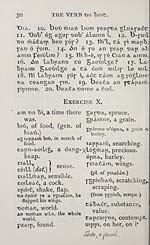Download files
Complete book:
Individual page:
Thumbnail gallery: Grid view | List view

OBSERVATIONS. 29
50 does not become $un for the past tense of x>o beic, nor
An, An, nor ní, nion, since in the form of the past tense
which would be required after these particles, i.e., }\Aib,
the no which is incorporated with these is already present.
Oub often aspirates the initial of the word which follows
it, as, but) bneÁj é, it was fine; but) triiAn l/iom, it was a
wish with me, I wished. When the word following but)
begins with a vowel or p followed by a vowel, t>o is often
prefixed to bub and joined with it ; as, •oob'ó^ í, she was
young; x>o b'peÁnn biom, it were better with me, I would
prefer, &c.
Note. — Any question in which the verb ir is used, or the
interrogative particles without a verb, may be answered by
the various forms of the verb -ir. If b-pnL be the
form employed, the answer must be cÁ, or ni b-pub (con-
tractedly ni'l). In the case of other forms of -oo beic and
in all other verbs it is necessary in answering a question to
repeat the verb, and if negative to use the proper particle.
Exercise IX.
Examples of the foregoing.
Omi, Kian, a man's glu&f&cc, to repair,
name. proceed.
•0015, a supposition. % m&-\ye&x>, well.
fe<ypo&, henceforth. v -pe^-ó, yes, it is.
perolim, Felim (Felix)
1. 5° t^ 1 ft m-Mc &50X. 2. tn.M^e&'ó, if
cu -mi ye&y is cÁ 511c. 3. 1f *oóii; l/iorn ^un
b'e&x). 4. UÁ jre&ji T)&p bVinm U^vó^ -Min-p
&n *o-ui§ pn &noij\ 5. 1f 'oóig tiom ^un mé
&n jre&tt & bei-óe&f &r)ny &n 5-C1II. 6. An
cu & CÁ &nn ? 7. iy mé 50 *oeinnn.
8. t)-ftnt cú ftÁn? g. UÁim, bint)e^c^f te
50 does not become $un for the past tense of x>o beic, nor
An, An, nor ní, nion, since in the form of the past tense
which would be required after these particles, i.e., }\Aib,
the no which is incorporated with these is already present.
Oub often aspirates the initial of the word which follows
it, as, but) bneÁj é, it was fine; but) triiAn l/iom, it was a
wish with me, I wished. When the word following but)
begins with a vowel or p followed by a vowel, t>o is often
prefixed to bub and joined with it ; as, •oob'ó^ í, she was
young; x>o b'peÁnn biom, it were better with me, I would
prefer, &c.
Note. — Any question in which the verb ir is used, or the
interrogative particles without a verb, may be answered by
the various forms of the verb -ir. If b-pnL be the
form employed, the answer must be cÁ, or ni b-pub (con-
tractedly ni'l). In the case of other forms of -oo beic and
in all other verbs it is necessary in answering a question to
repeat the verb, and if negative to use the proper particle.
Exercise IX.
Examples of the foregoing.
Omi, Kian, a man's glu&f&cc, to repair,
name. proceed.
•0015, a supposition. % m&-\ye&x>, well.
fe<ypo&, henceforth. v -pe^-ó, yes, it is.
perolim, Felim (Felix)
1. 5° t^ 1 ft m-Mc &50X. 2. tn.M^e&'ó, if
cu -mi ye&y is cÁ 511c. 3. 1f *oóii; l/iorn ^un
b'e&x). 4. UÁ jre&ji T)&p bVinm U^vó^ -Min-p
&n *o-ui§ pn &noij\ 5. 1f 'oóig tiom ^un mé
&n jre&tt & bei-óe&f &r)ny &n 5-C1II. 6. An
cu & CÁ &nn ? 7. iy mé 50 *oeinnn.
8. t)-ftnt cú ftÁn? g. UÁim, bint)e^c^f te
Set display mode to: Large image | Transcription
Images and transcriptions on this page, including medium image downloads, may be used under the Creative Commons Attribution 4.0 International Licence unless otherwise stated. ![]()
| Early Gaelic Book Collections > Blair Collection > Treas leabhar Gaedhilge > (35) |
|---|
| Permanent URL | https://digital.nls.uk/82321806 |
|---|
| Description | A selection of books from a collection of more than 500 titles, mostly on religious and literary topics. Also includes some material dealing with other Celtic languages and societies. Collection created towards the end of the 19th century by Lady Evelyn Stewart Murray. |
|---|
| Description | Selected items from five 'Special and Named Printed Collections'. Includes books in Gaelic and other Celtic languages, works about the Gaels, their languages, literature, culture and history. |
|---|

